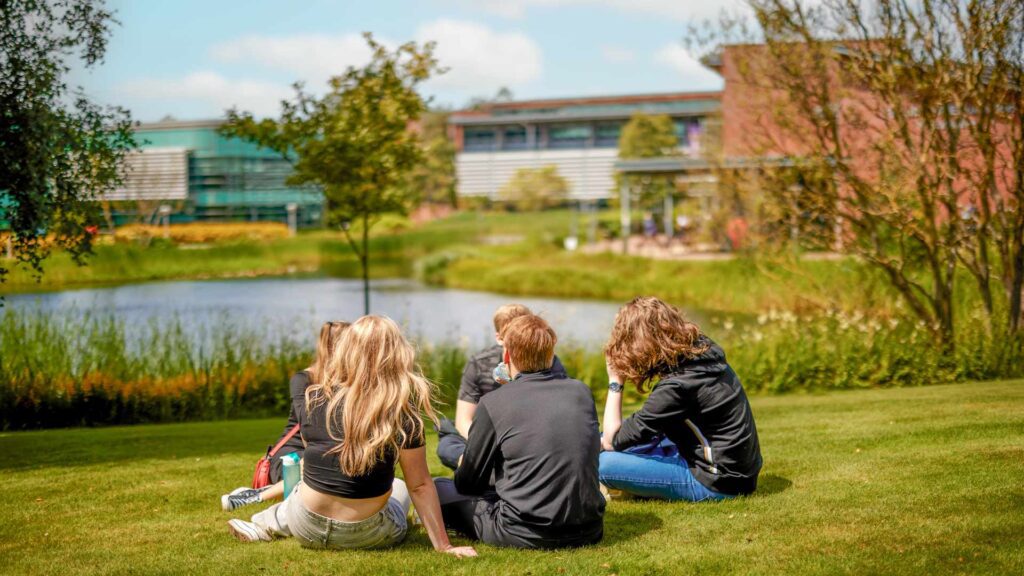MA Social Work course preparation
To help you feel prepared for your MA Social Work studies, we’ve put together a list of key department contacts and how to connect with them, where you can expect to learn and other tips on how to prepare for your transition to postgraduate study. Read on to find out more.

Where your learning will take place:
Your learning will mainly take place in our Faculty of Health, Social Care and Medicine. Here you’ll find outstanding facilities for the education and training of health and social care professionals. Facilities include:
- leading-edge clinical skills facilities
- an 860-seat lecture theatre
- teaching rooms
- social learning spaces
How to prepare for your transition to postgraduate study
At Edge Hill, we host a range specialist UniSkills workshops for all of our applicants to access. They’re particularly useful if you are about to enrol at Edge Hill University, or just looking to refresh your skills for the semester ahead.
We know that you’re aware that you’ll be putting in hard work to study for your course when you arrive. But it’s not just academic skills that you’ll be using once you’re here. And there are a few skills that you might want to refresh now so that you’re a pro when it comes to the start of your studies in September.
- Time management – you may have conflicting deadlines as well as other personal activities to consider. So you’ll want to make sure that you manage your time well so that you can do everything you’d like to do. But, there may be times when you can’t do it all but managing your time well will help you to prioritise which activities are necessary and which you have to miss out on.
- Critical thinking – it’s important to show your true understanding of the topics you cover in lectures. And for some of this, you’ll need to critique the work you’re studying in a professional, academic manner. You may already be completing tasks like this in your current studies, so university will be a chance to enhance these skills. Don’t be afraid to share your opinions.
- Teamwork – some modules may require you to work with others on your course to complete tasks and discuss analytical findings.
- Independent work – in contrary to the above, it’s also important to be able to work independently. The majority of your work will need to be submitted individually so it’s important to take ownership of your learning. And if there is something that you don’t understand, make sure to ask your tutor.
- Self-motivation – you’ll be encouraged to work more independently which means that you won’t have a teacher that chases you up to make sure you’ve completed a piece of work on time. So it’s important that you hold yourself accountable and make the decision to put the work in.
To remind yourself of your modules, please visit your course page:
If you’d like to complete any preparatory reading, you can search for any reading related to your course on our online reading list.

Useful websites:
Due to the nature of the programme, it’ll be useful for you to familiarise yourself with the relevant professional expectations and standards.
Some relevant pre-reading can be found on the following websites:
- BASW – Code of ethics
- Social Work England – Professional standards guidance
- Social Work England – Professional standards and students
- Social Work England – YouTube channel
- Social Work England – The professional identity of social work
Social Work Today is a free platform aimed to benefit all professionals in the social work and social care sectors. Explore some of these useful, web-based resources:
- Social Work Today
- IFSW
- Community Care Inform
- NSPCC Library
- The Social Care Institute for Excellence
- The Joseph Rowntree Foundation
Many journals and useful websites allow you to sign up for RSS feeds. This basically means that when new articles are published, you’ll receive an email with an update. This will really help ensure that you’re using current information in your assignments. Some good journals to explore are:
- British Journal of Social Work
- Journal of Social Work Practice
- Journal of Evidence Based Social Work
Materials you may need:
It’s a good idea to wait until you start your course to buy any books or specific equipment as your tutor will be able to provide more details about what is essential. And our library may be able to provide you with reading materials. But there are a few things you may want to consider.
- Academic diary – a staple to help you with your time management as well as upcoming tasks in both your academic and personal life.
- Notepads and pens – some people prefer to do this digitally rather than on paper, whichever you prefer, make sure you have the resources to complete any notes you’d like to take. If you like to write on a physical notepad, consider an A5 size so that it’s easier to carry around.
And of course, anything else that you like to use for your academic studies, like highlighters, flashcards and folders.

Making friends
We understand that sometimes it can feel a bit daunting when you join somewhere new for the first time. But we’re here to reassure you that whatever you’re feeling is normal and perfectly ok. Once you arrive, you’ll be able to find out what activities and clubs/societies are available for you to get involved with. These are the perfect way to meet like-minded individuals who share the same passions as you. Make sure to use our Student Life Portal to keep up to date with all the events happening at Edge Hill.